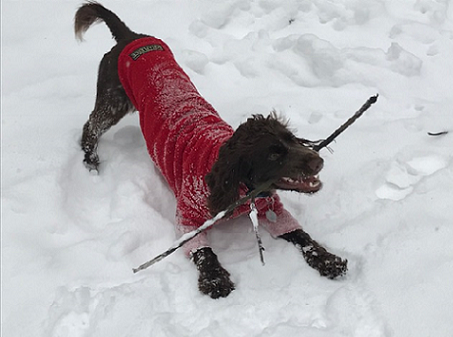Here’s how to care for your dog this winter!
Most dogs love nothing more than playing outside, but with wind, ice, snow and grit- there’s a lot to prepare for in the winter months as a dog owner. Just like humans, our four-legged friends are affected by the cold weather too, so here are a few simple tips to keep your dog happy and healthy throughout the winter months.

-
Wrap up for walks
Not all dogs need to wear a coat in the winter, but short-haired breeds, puppies and senior dogs will certainly benefit from the additional warmth when going on walks in the cooler months. There are thousands of dog coats, fleeces and jumpers on the market, but look for a coat that fits your dog well, sufficiently covering the neck and belly.
-
Check for salt and grit between their toes
When it’s cold outside, it is important to protect your dogs’ feet. Once you are home from your chilly winter walk, carefully remove any snow or salt from your dogs’ paws by rinsing with warm water. This will stop irritation and minimise the risk of harmful effects from anti-freeze.
-
Keep your dog warm and dry
Towel or blow-dry your soggy doggies when they return from their winter walks, making sure they have a warm cosy bed to return to. In the winter, place your dog’s bed in a warm spot, away from drafts and cold tiles with extra blankets and heat pads if needed.
-
Make your dog visible
As the dark nights draw closer, it’s important to keep your dog safe and visible. When you are out walking, make sure your dog is visible to other pedestrians and motorists. You can do this by buying a reflective harness, collar or lead for your dog, there are some fantastic hi-vis designs online and in pet stores.
-
Stay clear of frozen ponds, lakes and rivers
During the winter months, stay away from frozen ponds, lakes and rivers. If your dog has a tendency to jump into water, keep your dog on a lead near frozen water. If your dog does jump into cold or frozen waters, don’t be tempted to jump in after them, most dogs are strong swimmers and will manage to find their way out.
-
Avoid antifreeze
As you know, your dog’s natural instinct is to explore and try new things. Antifreeze has a very sweet taste to dogs, making dog poisoning a very common problem. Many dogs will lick antifreeze if they have access to it, so keep a close eye on your canine friend when walking in the winter. Symptoms of antifreeze poisoning include drooling, vomiting, seizures, thirst, panting and looking slight ‘drunk’. If you dog does come into contact with antifreeze, take them straight to the vets, as antifreeze poisoning can be fatal in dogs.
-
Be aware of frostbite
A short walk in the ice and snow shouldn’t do any harm to your dog in winter, but long walks in the snow increase your dogs’ risk of getting frostbite, commonly found on the paws, ears and tail. If your dog does have frostbite, get them into a warm dry area and wrap them in warm blankets and towels and contact your vet. Do not touch the frostbitten area or attempt to heat the area with a dryer or heating pad.
But most of all – enjoy the winter with your dogs, it can be a fabulous fun time for you and your dog! Have you booked your Barking Mad Dog Holiday yet? Don’t delay as we get very busy over the festive period.
Please note: Barking Mad, the UK’s leading home dog boarding provider, assumes no liability for the content of this page. This advice is not a substitute for a proper consultation with a vet and is only intended as a guide. Please contact your local veterinary practice for advice or treatment immediately if you are worried about your pet’s health – even if they are closed, they will always have an out of hours service available.




